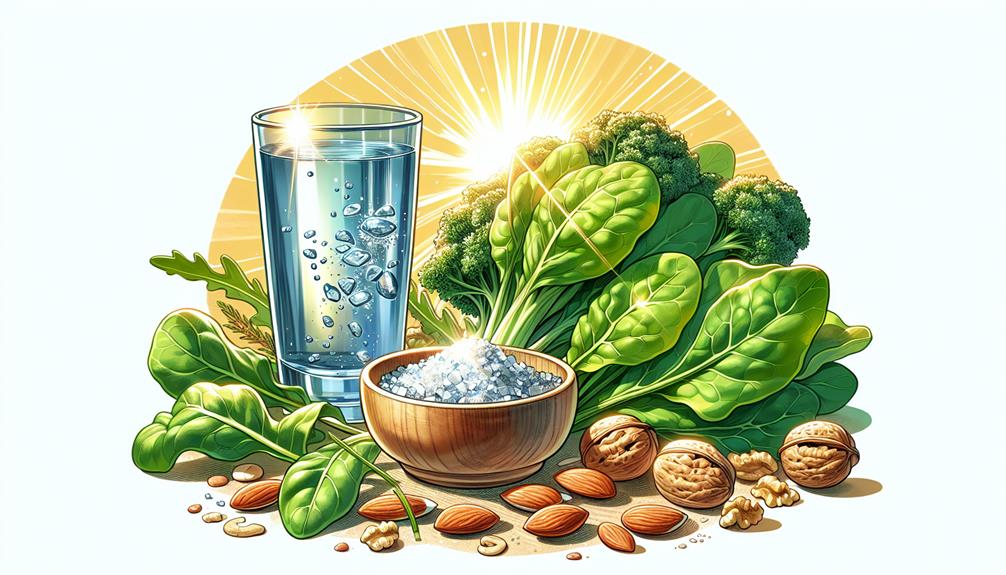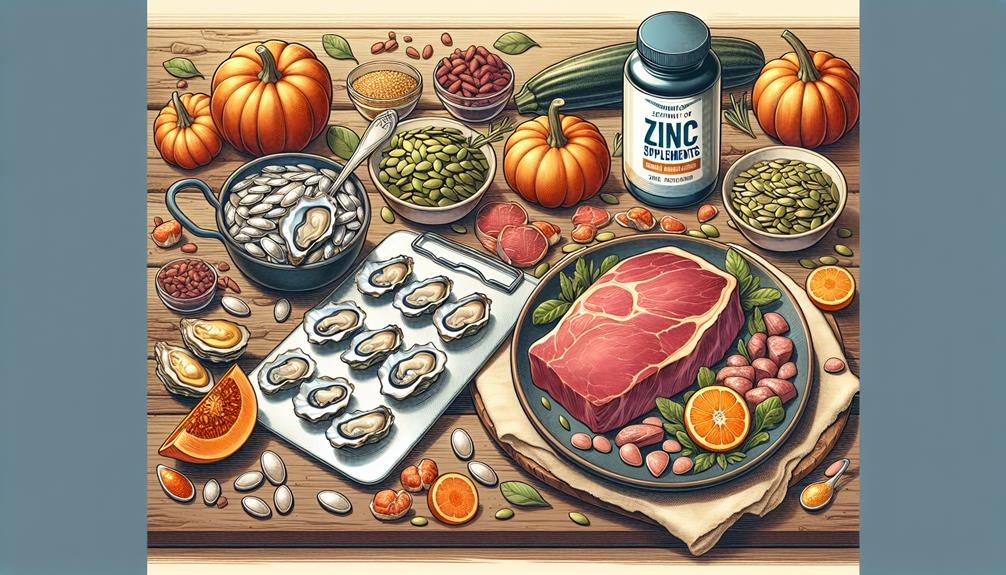Are you aware that nearly 90% of adults in the United States may have a deficiency in one or more essential vitamins or minerals? Understanding the role these nutrients play in your overall health is crucial for maintaining optimal well-being.
By exploring the top vitamin and mineral supplements, you can equip yourself with the knowledge needed to make informed decisions for your health. From the importance of Vitamin D to the power of Magnesium and the benefits of Vitamin C, each nutrient offers unique advantages that can enhance your vitality.
Key Takeaways
- Vitamin D aids in calcium absorption for strong bones and is crucial for overall health.
- Vitamin C boosts immune function, collagen production, and protects against chronic diseases.
- Magnesium is essential for nerve function, muscle relaxation, and energy production in the body.
- Iron facilitates oxygen transport, and zinc supports immune function and wound healing.
Importance of Vitamin D
If you're wondering why Vitamin D is crucial for your health, consider this: approximately 1 billion people worldwide are affected by Vitamin D deficiency.
Sunlight exposure is the key to kickstarting the synthesis of vitamin D in your skin. This essential vitamin plays a vital role in ensuring your body effectively absorbs calcium, which is crucial for maintaining strong and healthy bones.
When your vitamin D levels are low, your risk of developing conditions like osteoporosis, characterized by weakened bones, and fractures significantly increases. Certain populations, such as older adults and individuals with darker skin tones, are particularly at risk for vitamin D deficiency due to factors like reduced skin synthesis efficiency.
Ensuring you get enough vitamin D through sunlight exposure or supplementation is paramount in safeguarding your bone health and lowering the risk of fractures, especially in these at-risk populations.
Benefits of Vitamin C
Vitamin C, an essential nutrient for various bodily functions, is renowned for its role in collagen production, immune support, and antioxidant defense. This vitamin, also known as ascorbic acid, is crucial for wound healing, iron absorption, and maintaining healthy skin, teeth, and bones.
Found abundantly in citrus fruits, berries, kiwi, and peppers, vitamin C is easy to include in a balanced diet. Adequate intake is vital to prevent scurvy, a disease resulting from severe deficiency. Research suggests that vitamin C may reduce the duration and severity of colds, boost immune function, and protect against chronic diseases due to its antioxidant properties.
Power of Magnesium

Magnesium, a powerhouse mineral essential for numerous bodily functions, plays a critical role in over 300 biochemical reactions within your body. This vital mineral is crucial for proper nerve function, aiding in muscle relaxation, and supporting energy production. Without sufficient magnesium intake, you may experience symptoms like muscle cramps, fatigue, and irritability due to a potential deficiency. It's important to ensure you're getting an adequate amount of magnesium either through diet or supplementation.
Good food sources rich in magnesium include nuts, seeds, whole grains, and leafy green vegetables. However, if your dietary intake is low or if you have specific health conditions that may impact magnesium absorption, supplementing with magnesium could be beneficial. Consulting with a healthcare provider can help determine the right dosage and form of magnesium supplement for your individual needs. Prioritize maintaining optimal magnesium levels to support your overall health and well-being.
Role of Iron in Health
Iron plays a crucial role in maintaining your overall health by facilitating oxygen transport in the blood. This essential mineral enables red blood cells to carry oxygen throughout your body, ensuring proper functioning of tissues and organs. An iron deficiency can lead to anemia, characterized by symptoms like fatigue, weakness, and decreased immune function. To prevent deficiency, include good food sources of iron in your diet such as red meat, poultry, fish, beans, and fortified cereals.
The recommended daily intake of iron varies depending on your age and gender. Adult males typically need 8 mg per day, while adult females require 18 mg per day to support their physiological needs. Enhance iron absorption by consuming vitamin C-rich foods alongside iron sources. Avoid consuming calcium-rich foods at the same time, as calcium can inhibit iron absorption. By paying attention to your iron intake and absorption, you can support your body's oxygen transport and overall health.
Essential Zinc for Wellness

For optimal wellness and immune function, ensuring an adequate intake of essential zinc is crucial. Zinc is a vital mineral that plays a key role in supporting immune function, wound healing, and DNA synthesis. It's recommended that adult males consume 11 mg of zinc daily, while adult females should aim for 8 mg.
Zinc deficiency can have detrimental effects, such as impaired immune function, delayed wound healing, and growth issues in children. Dietary sources rich in zinc include red meat, poultry, seafood, nuts, seeds, and legumes. However, in cases where dietary intake is insufficient or certain health conditions increase the need for zinc, supplements may be beneficial.
Frequently Asked Questions
What Are the Best Vitamins for Optimal Health?
For optimal health, focus on essential vitamins like Vitamin D, C, and minerals such as magnesium. Incorporate Omega-3 fatty acids and iron for overall well-being. Prioritize a balanced diet and consult a healthcare professional for personalized guidance.
What Are the 3 Most Important Supplements to Take?
For optimal health, consider taking vitamin D, omega-3 fatty acids, and magnesium. These supplements support immune function, heart health, and energy production. They address common deficiencies and provide essential nutrients for overall well-being.
What Is the Number One Supplement Company?
You should consider the top supplement company based on sales and market share. They offer a wide range of high-quality products backed by research. Trust this company for your supplement needs, as millions of consumers worldwide do.
Do Vitamin and Mineral Supplements Actually Work?
Yes, vitamin and mineral supplements can work for you if you have specific deficiencies or needs. They can be beneficial, but remember to consult a healthcare provider to determine the right type and dosage for you.
Conclusion
You've learned about the vital role vitamins and minerals play in your overall health and well-being.
By understanding the importance of Vitamin D, the benefits of Vitamin C, the power of Magnesium, the role of Iron, and the essential need for Zinc, you can make informed decisions to optimize your nutrient intake.
Keep up with the latest scientific research and recommendations to support your health goals and lead a healthier, happier life.
I’m not just a supplement analyst. I’m an extremely qualified one! I am a Certified Nutrition Coach (CNC) and actually received my certification directly from the National Academy of Sports Medicine. I am also a Nutrition & Wellness Consultant, certified by the American Fitness Professionals Association (AFPA).


